Analysis of Nestle's Sustainable Practices and Operations Report
VerifiedAdded on 2020/04/15
|14
|3970
|31
Report
AI Summary
This report delves into the sustainable practices and operations management of Nestle, a prominent food and beverage company with commercial ties to New Zealand. It begins with a background on Nestle's operations and its commitment to sustainability, defining corporate sustainability and its various facets. The report then identifies and analyzes a significant sustainability challenge faced by Nestle, namely the infant formula boycott, and discusses its social, ethical, environmental, and financial impacts. A revised vision statement emphasizing sustainability is presented. The core of the report comprises an environmental analysis, utilizing PEST and SWOT frameworks to evaluate the political, ethical, technological, and legal trends affecting Nestle's business operations, as well as its internal strengths, weaknesses, opportunities, and threats. The analysis highlights Nestle's brand strength, product innovation, and research and development capabilities while also addressing challenges related to technological advancements, quality control, and legal compliance. The report concludes by discussing the company's operational strategies and its focus on providing nutritious products to its target market.
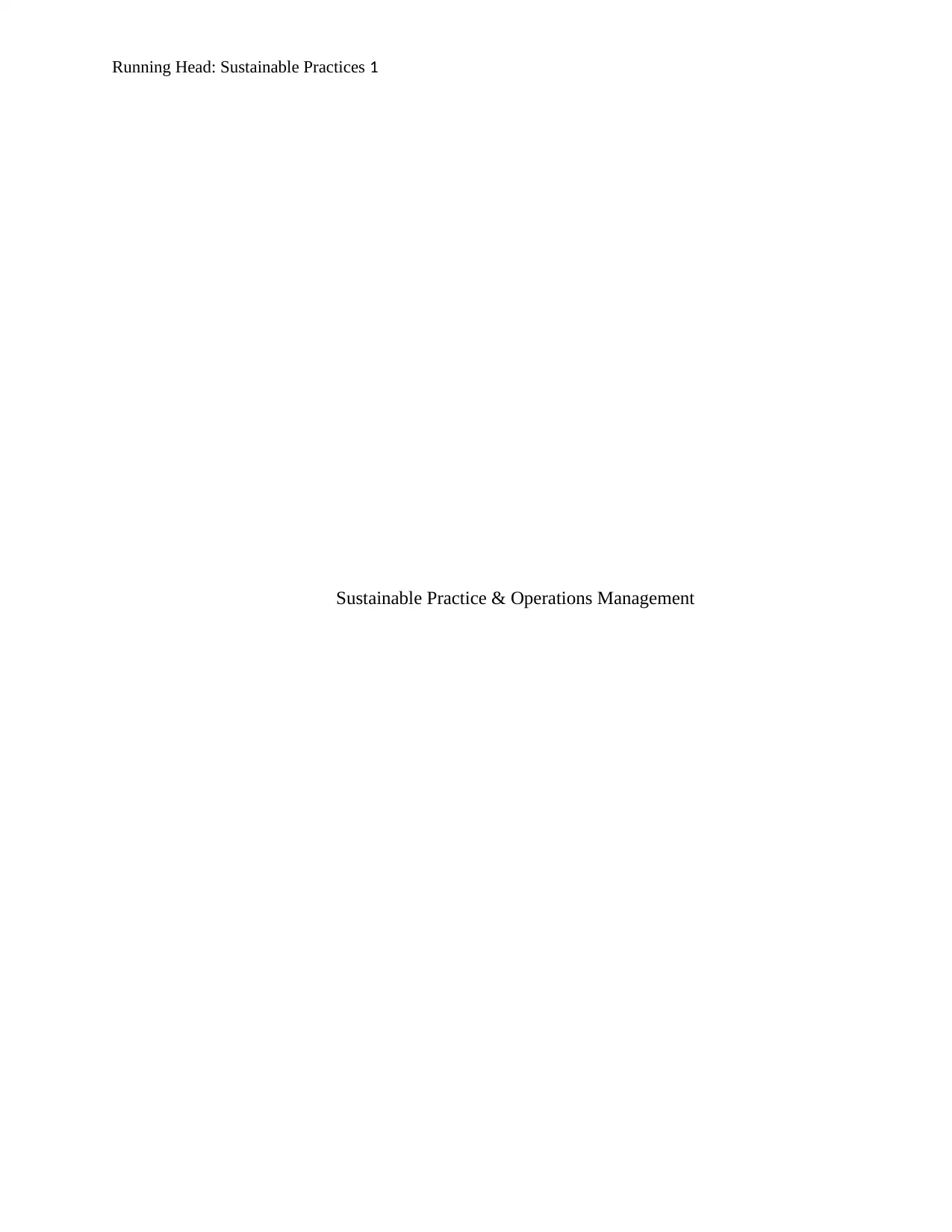
Running Head: Sustainable Practices 1
Sustainable Practice & Operations Management
Sustainable Practice & Operations Management
Paraphrase This Document
Need a fresh take? Get an instant paraphrase of this document with our AI Paraphraser
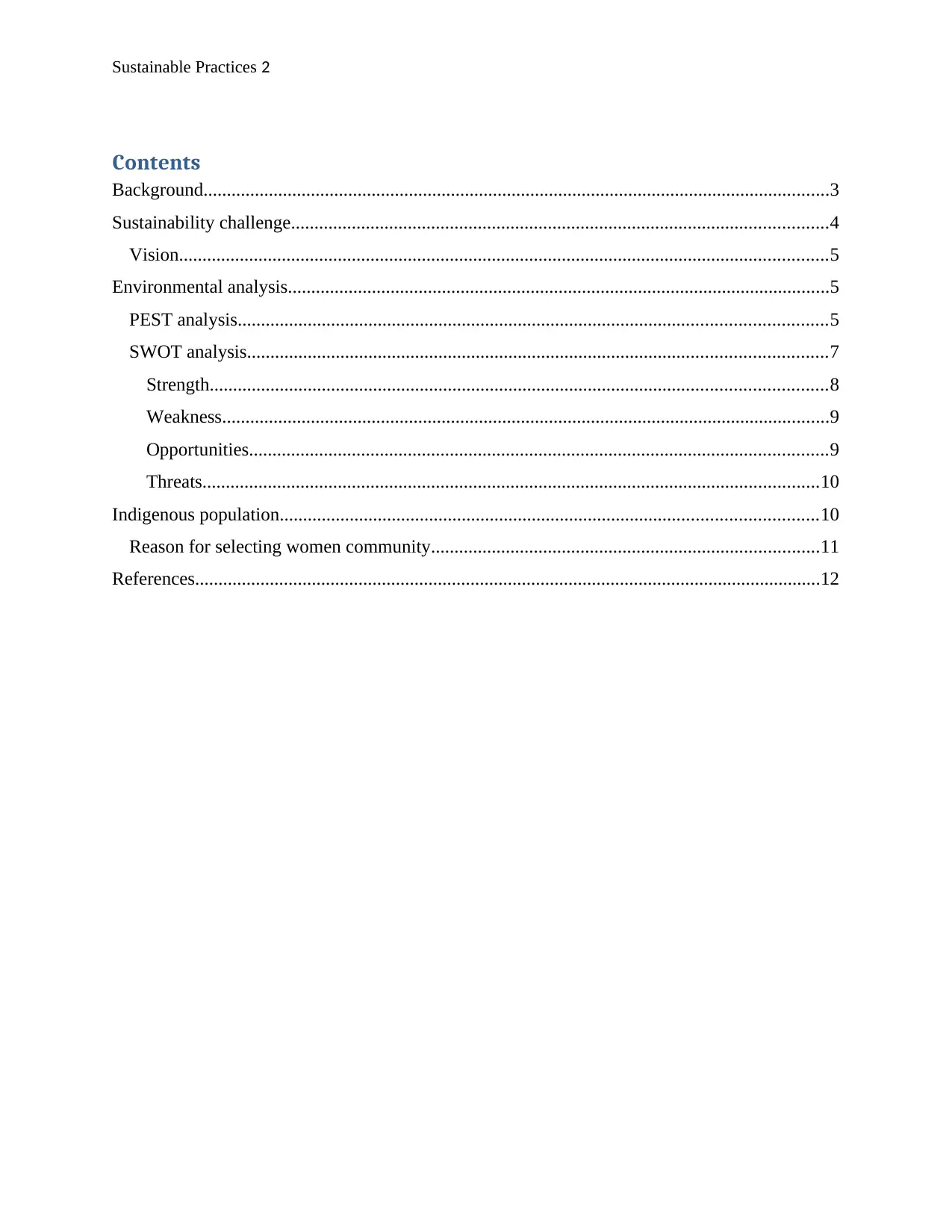
Sustainable Practices 2
Contents
Background......................................................................................................................................3
Sustainability challenge...................................................................................................................4
Vision...........................................................................................................................................5
Environmental analysis....................................................................................................................5
PEST analysis..............................................................................................................................5
SWOT analysis............................................................................................................................7
Strength....................................................................................................................................8
Weakness..................................................................................................................................9
Opportunities............................................................................................................................9
Threats....................................................................................................................................10
Indigenous population...................................................................................................................10
Reason for selecting women community...................................................................................11
References......................................................................................................................................12
Contents
Background......................................................................................................................................3
Sustainability challenge...................................................................................................................4
Vision...........................................................................................................................................5
Environmental analysis....................................................................................................................5
PEST analysis..............................................................................................................................5
SWOT analysis............................................................................................................................7
Strength....................................................................................................................................8
Weakness..................................................................................................................................9
Opportunities............................................................................................................................9
Threats....................................................................................................................................10
Indigenous population...................................................................................................................10
Reason for selecting women community...................................................................................11
References......................................................................................................................................12
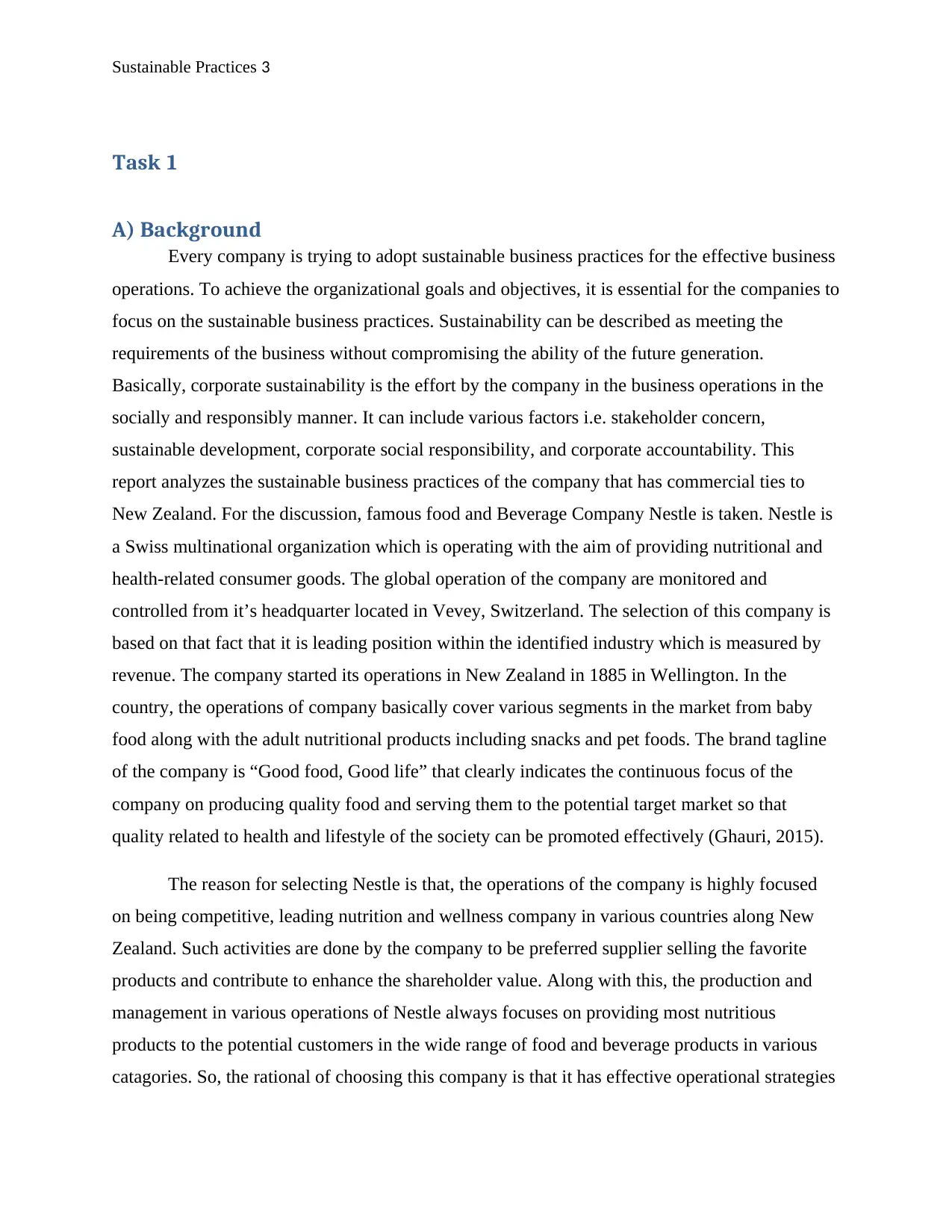
Sustainable Practices 3
Task 1
A) Background
Every company is trying to adopt sustainable business practices for the effective business
operations. To achieve the organizational goals and objectives, it is essential for the companies to
focus on the sustainable business practices. Sustainability can be described as meeting the
requirements of the business without compromising the ability of the future generation.
Basically, corporate sustainability is the effort by the company in the business operations in the
socially and responsibly manner. It can include various factors i.e. stakeholder concern,
sustainable development, corporate social responsibility, and corporate accountability. This
report analyzes the sustainable business practices of the company that has commercial ties to
New Zealand. For the discussion, famous food and Beverage Company Nestle is taken. Nestle is
a Swiss multinational organization which is operating with the aim of providing nutritional and
health-related consumer goods. The global operation of the company are monitored and
controlled from it’s headquarter located in Vevey, Switzerland. The selection of this company is
based on that fact that it is leading position within the identified industry which is measured by
revenue. The company started its operations in New Zealand in 1885 in Wellington. In the
country, the operations of company basically cover various segments in the market from baby
food along with the adult nutritional products including snacks and pet foods. The brand tagline
of the company is “Good food, Good life” that clearly indicates the continuous focus of the
company on producing quality food and serving them to the potential target market so that
quality related to health and lifestyle of the society can be promoted effectively (Ghauri, 2015).
The reason for selecting Nestle is that, the operations of the company is highly focused
on being competitive, leading nutrition and wellness company in various countries along New
Zealand. Such activities are done by the company to be preferred supplier selling the favorite
products and contribute to enhance the shareholder value. Along with this, the production and
management in various operations of Nestle always focuses on providing most nutritious
products to the potential customers in the wide range of food and beverage products in various
catagories. So, the rational of choosing this company is that it has effective operational strategies
Task 1
A) Background
Every company is trying to adopt sustainable business practices for the effective business
operations. To achieve the organizational goals and objectives, it is essential for the companies to
focus on the sustainable business practices. Sustainability can be described as meeting the
requirements of the business without compromising the ability of the future generation.
Basically, corporate sustainability is the effort by the company in the business operations in the
socially and responsibly manner. It can include various factors i.e. stakeholder concern,
sustainable development, corporate social responsibility, and corporate accountability. This
report analyzes the sustainable business practices of the company that has commercial ties to
New Zealand. For the discussion, famous food and Beverage Company Nestle is taken. Nestle is
a Swiss multinational organization which is operating with the aim of providing nutritional and
health-related consumer goods. The global operation of the company are monitored and
controlled from it’s headquarter located in Vevey, Switzerland. The selection of this company is
based on that fact that it is leading position within the identified industry which is measured by
revenue. The company started its operations in New Zealand in 1885 in Wellington. In the
country, the operations of company basically cover various segments in the market from baby
food along with the adult nutritional products including snacks and pet foods. The brand tagline
of the company is “Good food, Good life” that clearly indicates the continuous focus of the
company on producing quality food and serving them to the potential target market so that
quality related to health and lifestyle of the society can be promoted effectively (Ghauri, 2015).
The reason for selecting Nestle is that, the operations of the company is highly focused
on being competitive, leading nutrition and wellness company in various countries along New
Zealand. Such activities are done by the company to be preferred supplier selling the favorite
products and contribute to enhance the shareholder value. Along with this, the production and
management in various operations of Nestle always focuses on providing most nutritious
products to the potential customers in the wide range of food and beverage products in various
catagories. So, the rational of choosing this company is that it has effective operational strategies
⊘ This is a preview!⊘
Do you want full access?
Subscribe today to unlock all pages.

Trusted by 1+ million students worldwide
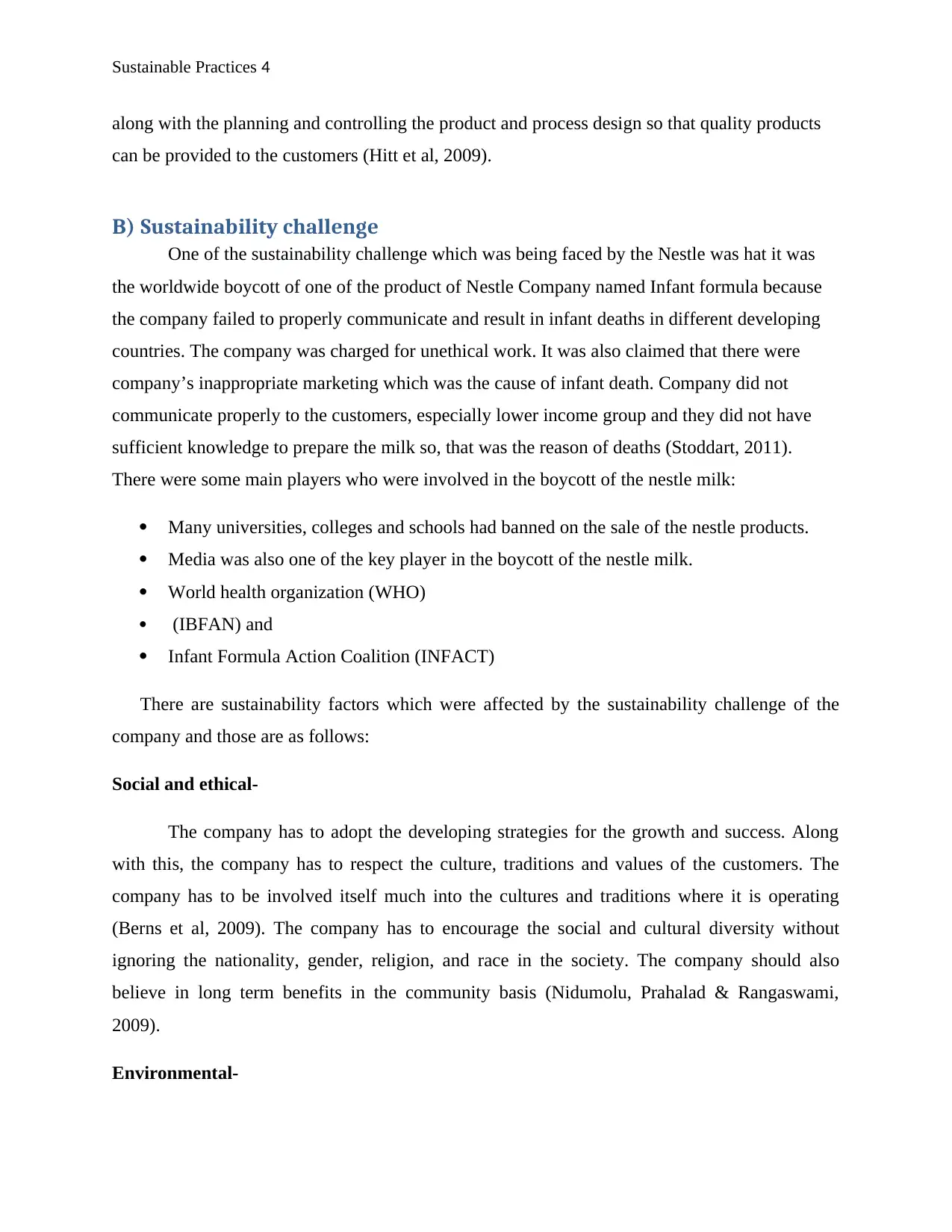
Sustainable Practices 4
along with the planning and controlling the product and process design so that quality products
can be provided to the customers (Hitt et al, 2009).
B) Sustainability challenge
One of the sustainability challenge which was being faced by the Nestle was hat it was
the worldwide boycott of one of the product of Nestle Company named Infant formula because
the company failed to properly communicate and result in infant deaths in different developing
countries. The company was charged for unethical work. It was also claimed that there were
company’s inappropriate marketing which was the cause of infant death. Company did not
communicate properly to the customers, especially lower income group and they did not have
sufficient knowledge to prepare the milk so, that was the reason of deaths (Stoddart, 2011).
There were some main players who were involved in the boycott of the nestle milk:
Many universities, colleges and schools had banned on the sale of the nestle products.
Media was also one of the key player in the boycott of the nestle milk.
World health organization (WHO)
(IBFAN) and
Infant Formula Action Coalition (INFACT)
There are sustainability factors which were affected by the sustainability challenge of the
company and those are as follows:
Social and ethical-
The company has to adopt the developing strategies for the growth and success. Along
with this, the company has to respect the culture, traditions and values of the customers. The
company has to be involved itself much into the cultures and traditions where it is operating
(Berns et al, 2009). The company has to encourage the social and cultural diversity without
ignoring the nationality, gender, religion, and race in the society. The company should also
believe in long term benefits in the community basis (Nidumolu, Prahalad & Rangaswami,
2009).
Environmental-
along with the planning and controlling the product and process design so that quality products
can be provided to the customers (Hitt et al, 2009).
B) Sustainability challenge
One of the sustainability challenge which was being faced by the Nestle was hat it was
the worldwide boycott of one of the product of Nestle Company named Infant formula because
the company failed to properly communicate and result in infant deaths in different developing
countries. The company was charged for unethical work. It was also claimed that there were
company’s inappropriate marketing which was the cause of infant death. Company did not
communicate properly to the customers, especially lower income group and they did not have
sufficient knowledge to prepare the milk so, that was the reason of deaths (Stoddart, 2011).
There were some main players who were involved in the boycott of the nestle milk:
Many universities, colleges and schools had banned on the sale of the nestle products.
Media was also one of the key player in the boycott of the nestle milk.
World health organization (WHO)
(IBFAN) and
Infant Formula Action Coalition (INFACT)
There are sustainability factors which were affected by the sustainability challenge of the
company and those are as follows:
Social and ethical-
The company has to adopt the developing strategies for the growth and success. Along
with this, the company has to respect the culture, traditions and values of the customers. The
company has to be involved itself much into the cultures and traditions where it is operating
(Berns et al, 2009). The company has to encourage the social and cultural diversity without
ignoring the nationality, gender, religion, and race in the society. The company should also
believe in long term benefits in the community basis (Nidumolu, Prahalad & Rangaswami,
2009).
Environmental-
Paraphrase This Document
Need a fresh take? Get an instant paraphrase of this document with our AI Paraphraser
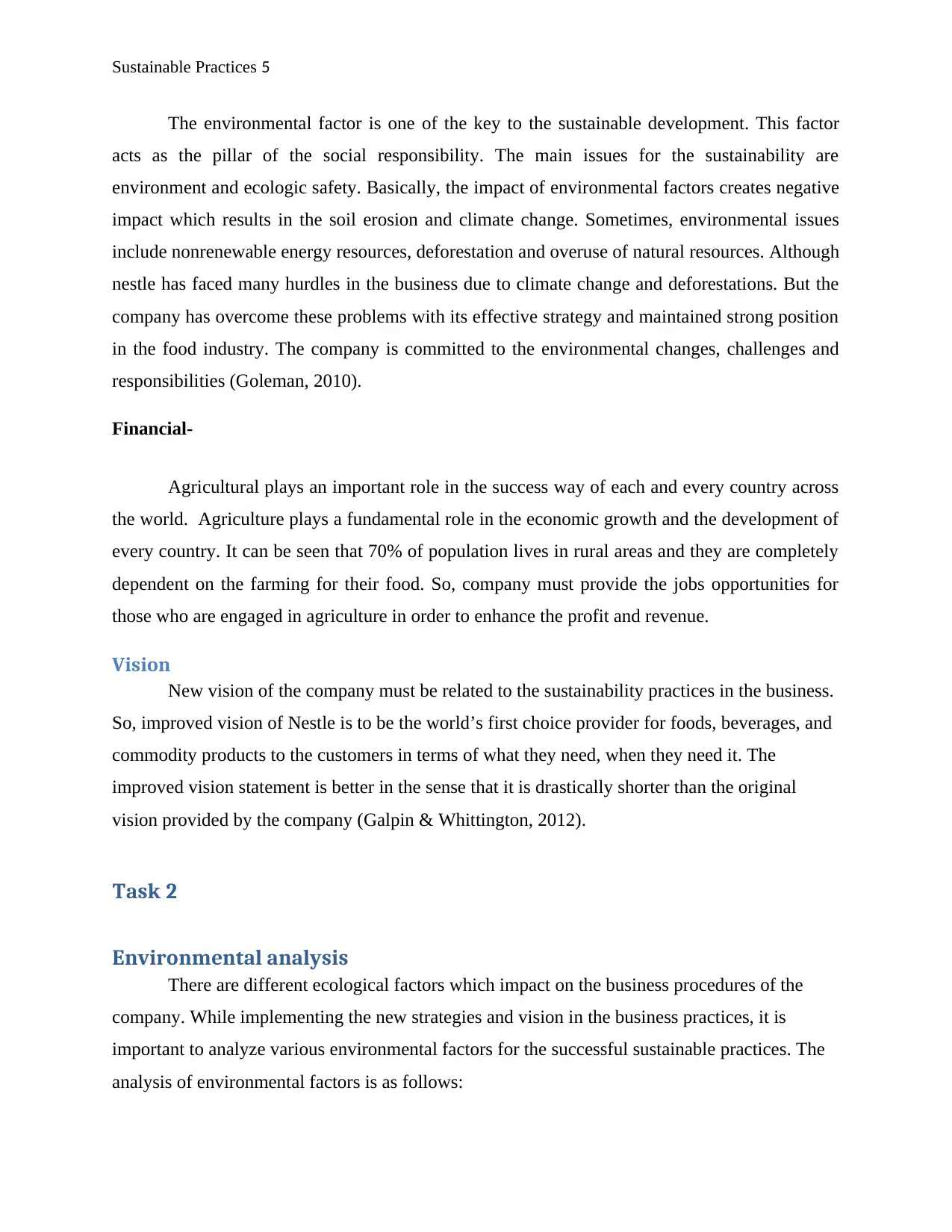
Sustainable Practices 5
The environmental factor is one of the key to the sustainable development. This factor
acts as the pillar of the social responsibility. The main issues for the sustainability are
environment and ecologic safety. Basically, the impact of environmental factors creates negative
impact which results in the soil erosion and climate change. Sometimes, environmental issues
include nonrenewable energy resources, deforestation and overuse of natural resources. Although
nestle has faced many hurdles in the business due to climate change and deforestations. But the
company has overcome these problems with its effective strategy and maintained strong position
in the food industry. The company is committed to the environmental changes, challenges and
responsibilities (Goleman, 2010).
Financial-
Agricultural plays an important role in the success way of each and every country across
the world. Agriculture plays a fundamental role in the economic growth and the development of
every country. It can be seen that 70% of population lives in rural areas and they are completely
dependent on the farming for their food. So, company must provide the jobs opportunities for
those who are engaged in agriculture in order to enhance the profit and revenue.
Vision
New vision of the company must be related to the sustainability practices in the business.
So, improved vision of Nestle is to be the world’s first choice provider for foods, beverages, and
commodity products to the customers in terms of what they need, when they need it. The
improved vision statement is better in the sense that it is drastically shorter than the original
vision provided by the company (Galpin & Whittington, 2012).
Task 2
Environmental analysis
There are different ecological factors which impact on the business procedures of the
company. While implementing the new strategies and vision in the business practices, it is
important to analyze various environmental factors for the successful sustainable practices. The
analysis of environmental factors is as follows:
The environmental factor is one of the key to the sustainable development. This factor
acts as the pillar of the social responsibility. The main issues for the sustainability are
environment and ecologic safety. Basically, the impact of environmental factors creates negative
impact which results in the soil erosion and climate change. Sometimes, environmental issues
include nonrenewable energy resources, deforestation and overuse of natural resources. Although
nestle has faced many hurdles in the business due to climate change and deforestations. But the
company has overcome these problems with its effective strategy and maintained strong position
in the food industry. The company is committed to the environmental changes, challenges and
responsibilities (Goleman, 2010).
Financial-
Agricultural plays an important role in the success way of each and every country across
the world. Agriculture plays a fundamental role in the economic growth and the development of
every country. It can be seen that 70% of population lives in rural areas and they are completely
dependent on the farming for their food. So, company must provide the jobs opportunities for
those who are engaged in agriculture in order to enhance the profit and revenue.
Vision
New vision of the company must be related to the sustainability practices in the business.
So, improved vision of Nestle is to be the world’s first choice provider for foods, beverages, and
commodity products to the customers in terms of what they need, when they need it. The
improved vision statement is better in the sense that it is drastically shorter than the original
vision provided by the company (Galpin & Whittington, 2012).
Task 2
Environmental analysis
There are different ecological factors which impact on the business procedures of the
company. While implementing the new strategies and vision in the business practices, it is
important to analyze various environmental factors for the successful sustainable practices. The
analysis of environmental factors is as follows:
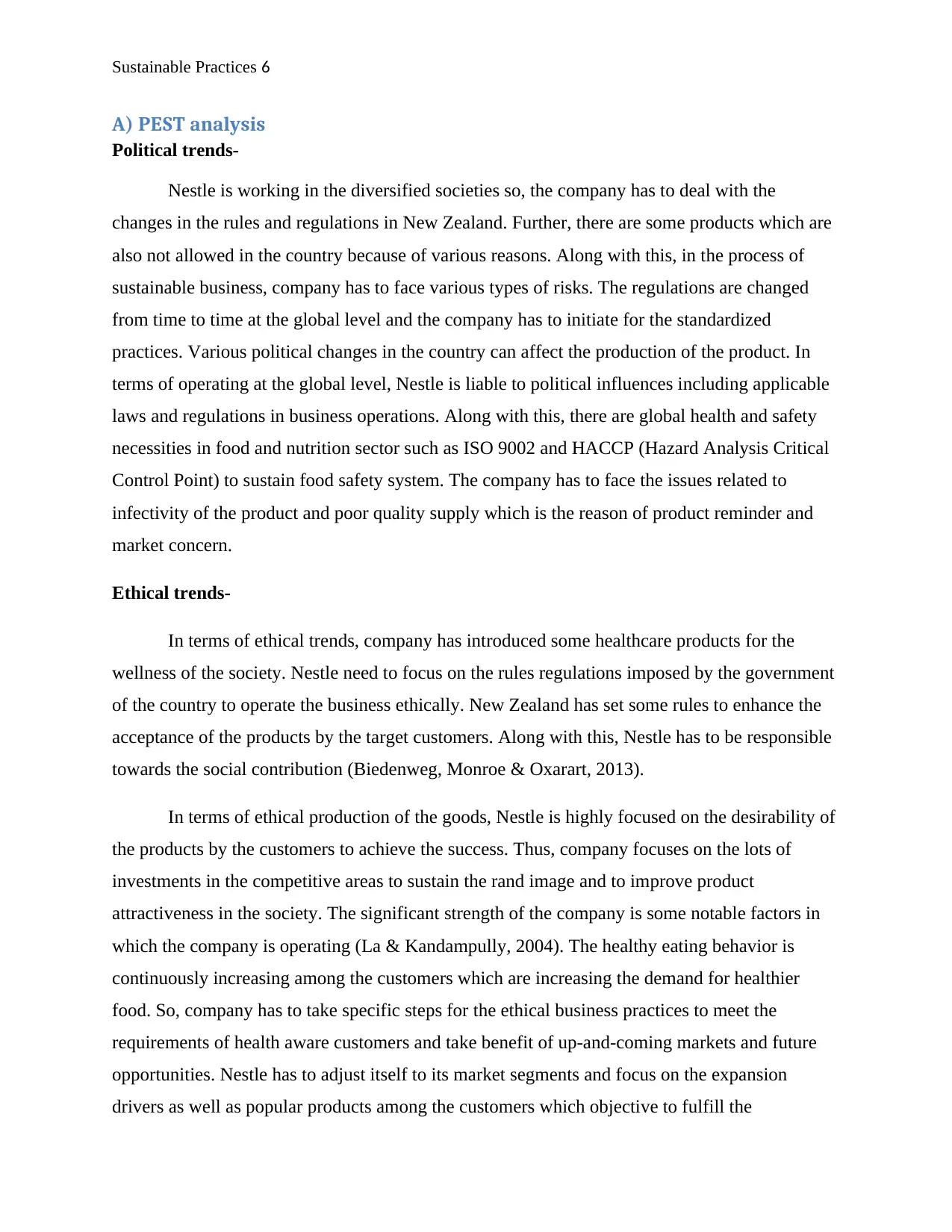
Sustainable Practices 6
A) PEST analysis
Political trends-
Nestle is working in the diversified societies so, the company has to deal with the
changes in the rules and regulations in New Zealand. Further, there are some products which are
also not allowed in the country because of various reasons. Along with this, in the process of
sustainable business, company has to face various types of risks. The regulations are changed
from time to time at the global level and the company has to initiate for the standardized
practices. Various political changes in the country can affect the production of the product. In
terms of operating at the global level, Nestle is liable to political influences including applicable
laws and regulations in business operations. Along with this, there are global health and safety
necessities in food and nutrition sector such as ISO 9002 and HACCP (Hazard Analysis Critical
Control Point) to sustain food safety system. The company has to face the issues related to
infectivity of the product and poor quality supply which is the reason of product reminder and
market concern.
Ethical trends-
In terms of ethical trends, company has introduced some healthcare products for the
wellness of the society. Nestle need to focus on the rules regulations imposed by the government
of the country to operate the business ethically. New Zealand has set some rules to enhance the
acceptance of the products by the target customers. Along with this, Nestle has to be responsible
towards the social contribution (Biedenweg, Monroe & Oxarart, 2013).
In terms of ethical production of the goods, Nestle is highly focused on the desirability of
the products by the customers to achieve the success. Thus, company focuses on the lots of
investments in the competitive areas to sustain the rand image and to improve product
attractiveness in the society. The significant strength of the company is some notable factors in
which the company is operating (La & Kandampully, 2004). The healthy eating behavior is
continuously increasing among the customers which are increasing the demand for healthier
food. So, company has to take specific steps for the ethical business practices to meet the
requirements of health aware customers and take benefit of up-and-coming markets and future
opportunities. Nestle has to adjust itself to its market segments and focus on the expansion
drivers as well as popular products among the customers which objective to fulfill the
A) PEST analysis
Political trends-
Nestle is working in the diversified societies so, the company has to deal with the
changes in the rules and regulations in New Zealand. Further, there are some products which are
also not allowed in the country because of various reasons. Along with this, in the process of
sustainable business, company has to face various types of risks. The regulations are changed
from time to time at the global level and the company has to initiate for the standardized
practices. Various political changes in the country can affect the production of the product. In
terms of operating at the global level, Nestle is liable to political influences including applicable
laws and regulations in business operations. Along with this, there are global health and safety
necessities in food and nutrition sector such as ISO 9002 and HACCP (Hazard Analysis Critical
Control Point) to sustain food safety system. The company has to face the issues related to
infectivity of the product and poor quality supply which is the reason of product reminder and
market concern.
Ethical trends-
In terms of ethical trends, company has introduced some healthcare products for the
wellness of the society. Nestle need to focus on the rules regulations imposed by the government
of the country to operate the business ethically. New Zealand has set some rules to enhance the
acceptance of the products by the target customers. Along with this, Nestle has to be responsible
towards the social contribution (Biedenweg, Monroe & Oxarart, 2013).
In terms of ethical production of the goods, Nestle is highly focused on the desirability of
the products by the customers to achieve the success. Thus, company focuses on the lots of
investments in the competitive areas to sustain the rand image and to improve product
attractiveness in the society. The significant strength of the company is some notable factors in
which the company is operating (La & Kandampully, 2004). The healthy eating behavior is
continuously increasing among the customers which are increasing the demand for healthier
food. So, company has to take specific steps for the ethical business practices to meet the
requirements of health aware customers and take benefit of up-and-coming markets and future
opportunities. Nestle has to adjust itself to its market segments and focus on the expansion
drivers as well as popular products among the customers which objective to fulfill the
⊘ This is a preview!⊘
Do you want full access?
Subscribe today to unlock all pages.

Trusted by 1+ million students worldwide
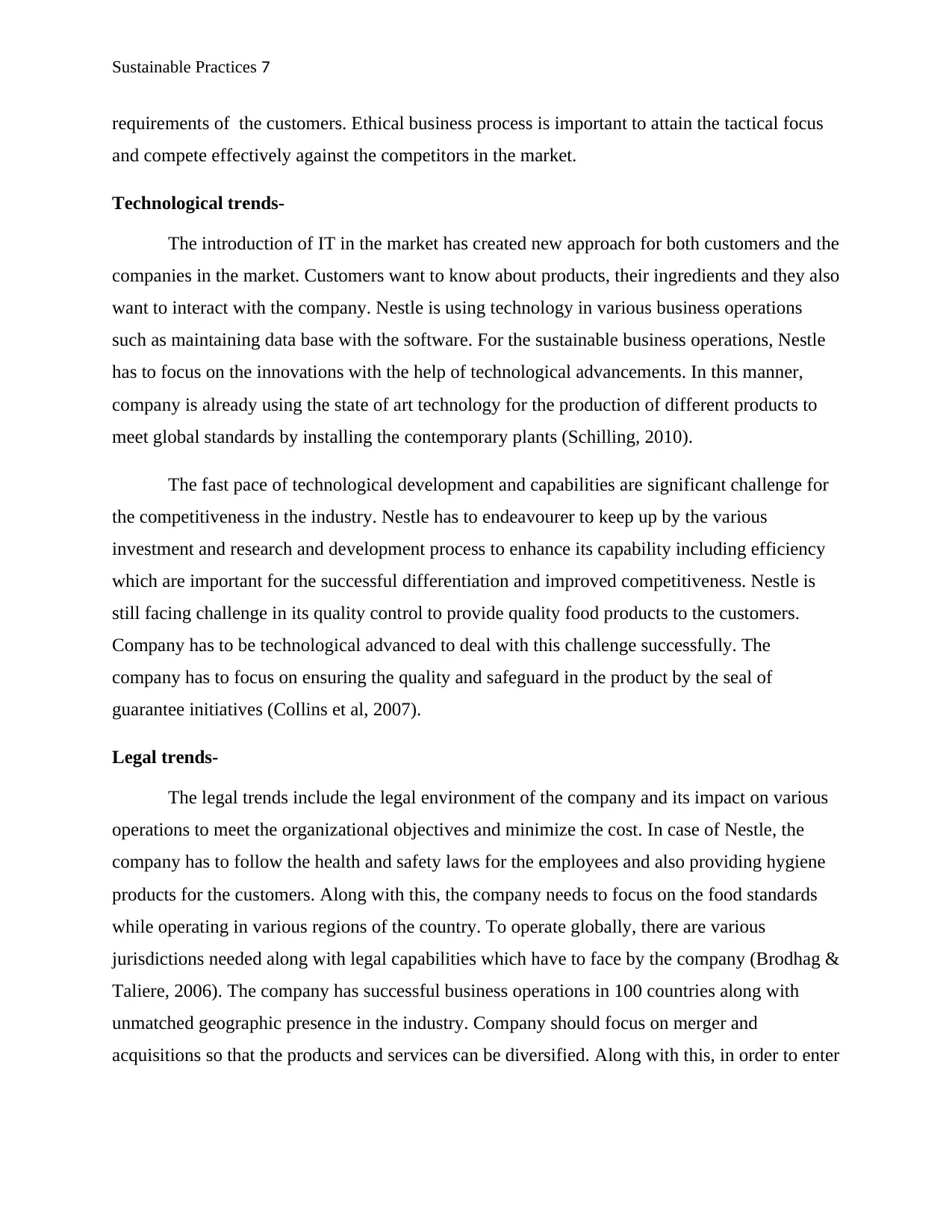
Sustainable Practices 7
requirements of the customers. Ethical business process is important to attain the tactical focus
and compete effectively against the competitors in the market.
Technological trends-
The introduction of IT in the market has created new approach for both customers and the
companies in the market. Customers want to know about products, their ingredients and they also
want to interact with the company. Nestle is using technology in various business operations
such as maintaining data base with the software. For the sustainable business operations, Nestle
has to focus on the innovations with the help of technological advancements. In this manner,
company is already using the state of art technology for the production of different products to
meet global standards by installing the contemporary plants (Schilling, 2010).
The fast pace of technological development and capabilities are significant challenge for
the competitiveness in the industry. Nestle has to endeavourer to keep up by the various
investment and research and development process to enhance its capability including efficiency
which are important for the successful differentiation and improved competitiveness. Nestle is
still facing challenge in its quality control to provide quality food products to the customers.
Company has to be technological advanced to deal with this challenge successfully. The
company has to focus on ensuring the quality and safeguard in the product by the seal of
guarantee initiatives (Collins et al, 2007).
Legal trends-
The legal trends include the legal environment of the company and its impact on various
operations to meet the organizational objectives and minimize the cost. In case of Nestle, the
company has to follow the health and safety laws for the employees and also providing hygiene
products for the customers. Along with this, the company needs to focus on the food standards
while operating in various regions of the country. To operate globally, there are various
jurisdictions needed along with legal capabilities which have to face by the company (Brodhag &
Taliere, 2006). The company has successful business operations in 100 countries along with
unmatched geographic presence in the industry. Company should focus on merger and
acquisitions so that the products and services can be diversified. Along with this, in order to enter
requirements of the customers. Ethical business process is important to attain the tactical focus
and compete effectively against the competitors in the market.
Technological trends-
The introduction of IT in the market has created new approach for both customers and the
companies in the market. Customers want to know about products, their ingredients and they also
want to interact with the company. Nestle is using technology in various business operations
such as maintaining data base with the software. For the sustainable business operations, Nestle
has to focus on the innovations with the help of technological advancements. In this manner,
company is already using the state of art technology for the production of different products to
meet global standards by installing the contemporary plants (Schilling, 2010).
The fast pace of technological development and capabilities are significant challenge for
the competitiveness in the industry. Nestle has to endeavourer to keep up by the various
investment and research and development process to enhance its capability including efficiency
which are important for the successful differentiation and improved competitiveness. Nestle is
still facing challenge in its quality control to provide quality food products to the customers.
Company has to be technological advanced to deal with this challenge successfully. The
company has to focus on ensuring the quality and safeguard in the product by the seal of
guarantee initiatives (Collins et al, 2007).
Legal trends-
The legal trends include the legal environment of the company and its impact on various
operations to meet the organizational objectives and minimize the cost. In case of Nestle, the
company has to follow the health and safety laws for the employees and also providing hygiene
products for the customers. Along with this, the company needs to focus on the food standards
while operating in various regions of the country. To operate globally, there are various
jurisdictions needed along with legal capabilities which have to face by the company (Brodhag &
Taliere, 2006). The company has successful business operations in 100 countries along with
unmatched geographic presence in the industry. Company should focus on merger and
acquisitions so that the products and services can be diversified. Along with this, in order to enter
Paraphrase This Document
Need a fresh take? Get an instant paraphrase of this document with our AI Paraphraser
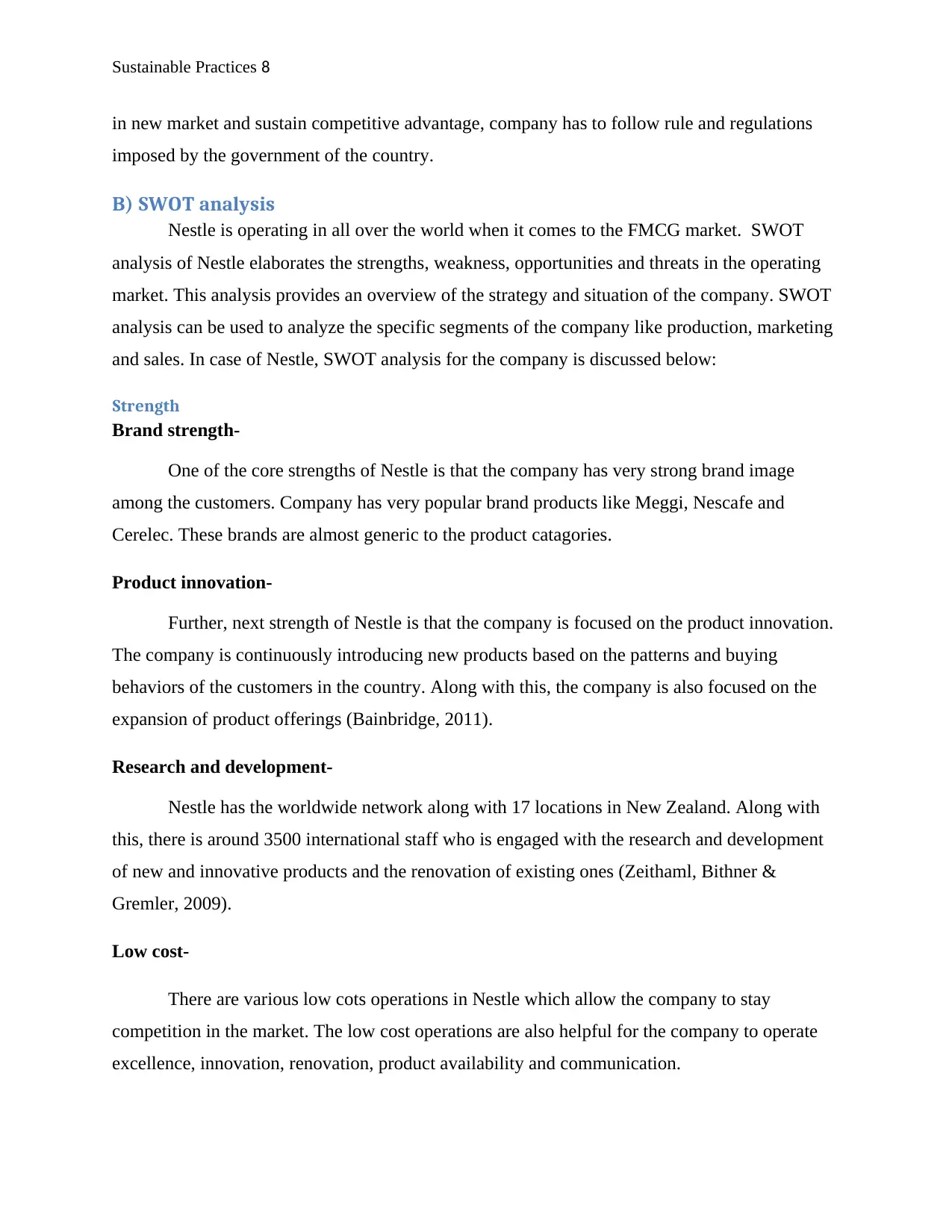
Sustainable Practices 8
in new market and sustain competitive advantage, company has to follow rule and regulations
imposed by the government of the country.
B) SWOT analysis
Nestle is operating in all over the world when it comes to the FMCG market. SWOT
analysis of Nestle elaborates the strengths, weakness, opportunities and threats in the operating
market. This analysis provides an overview of the strategy and situation of the company. SWOT
analysis can be used to analyze the specific segments of the company like production, marketing
and sales. In case of Nestle, SWOT analysis for the company is discussed below:
Strength
Brand strength-
One of the core strengths of Nestle is that the company has very strong brand image
among the customers. Company has very popular brand products like Meggi, Nescafe and
Cerelec. These brands are almost generic to the product catagories.
Product innovation-
Further, next strength of Nestle is that the company is focused on the product innovation.
The company is continuously introducing new products based on the patterns and buying
behaviors of the customers in the country. Along with this, the company is also focused on the
expansion of product offerings (Bainbridge, 2011).
Research and development-
Nestle has the worldwide network along with 17 locations in New Zealand. Along with
this, there is around 3500 international staff who is engaged with the research and development
of new and innovative products and the renovation of existing ones (Zeithaml, Bithner &
Gremler, 2009).
Low cost-
There are various low cots operations in Nestle which allow the company to stay
competition in the market. The low cost operations are also helpful for the company to operate
excellence, innovation, renovation, product availability and communication.
in new market and sustain competitive advantage, company has to follow rule and regulations
imposed by the government of the country.
B) SWOT analysis
Nestle is operating in all over the world when it comes to the FMCG market. SWOT
analysis of Nestle elaborates the strengths, weakness, opportunities and threats in the operating
market. This analysis provides an overview of the strategy and situation of the company. SWOT
analysis can be used to analyze the specific segments of the company like production, marketing
and sales. In case of Nestle, SWOT analysis for the company is discussed below:
Strength
Brand strength-
One of the core strengths of Nestle is that the company has very strong brand image
among the customers. Company has very popular brand products like Meggi, Nescafe and
Cerelec. These brands are almost generic to the product catagories.
Product innovation-
Further, next strength of Nestle is that the company is focused on the product innovation.
The company is continuously introducing new products based on the patterns and buying
behaviors of the customers in the country. Along with this, the company is also focused on the
expansion of product offerings (Bainbridge, 2011).
Research and development-
Nestle has the worldwide network along with 17 locations in New Zealand. Along with
this, there is around 3500 international staff who is engaged with the research and development
of new and innovative products and the renovation of existing ones (Zeithaml, Bithner &
Gremler, 2009).
Low cost-
There are various low cots operations in Nestle which allow the company to stay
competition in the market. The low cost operations are also helpful for the company to operate
excellence, innovation, renovation, product availability and communication.
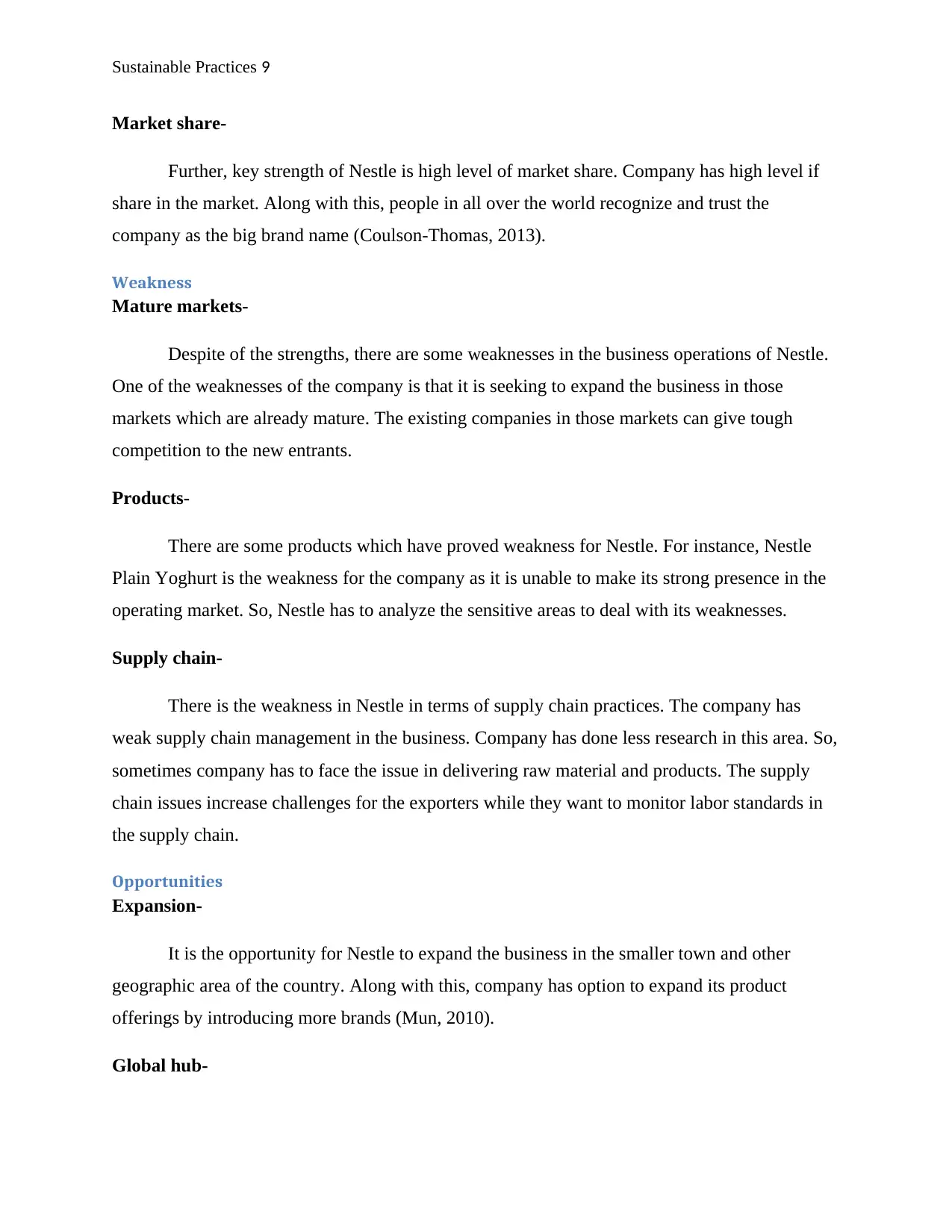
Sustainable Practices 9
Market share-
Further, key strength of Nestle is high level of market share. Company has high level if
share in the market. Along with this, people in all over the world recognize and trust the
company as the big brand name (Coulson-Thomas, 2013).
Weakness
Mature markets-
Despite of the strengths, there are some weaknesses in the business operations of Nestle.
One of the weaknesses of the company is that it is seeking to expand the business in those
markets which are already mature. The existing companies in those markets can give tough
competition to the new entrants.
Products-
There are some products which have proved weakness for Nestle. For instance, Nestle
Plain Yoghurt is the weakness for the company as it is unable to make its strong presence in the
operating market. So, Nestle has to analyze the sensitive areas to deal with its weaknesses.
Supply chain-
There is the weakness in Nestle in terms of supply chain practices. The company has
weak supply chain management in the business. Company has done less research in this area. So,
sometimes company has to face the issue in delivering raw material and products. The supply
chain issues increase challenges for the exporters while they want to monitor labor standards in
the supply chain.
Opportunities
Expansion-
It is the opportunity for Nestle to expand the business in the smaller town and other
geographic area of the country. Along with this, company has option to expand its product
offerings by introducing more brands (Mun, 2010).
Global hub-
Market share-
Further, key strength of Nestle is high level of market share. Company has high level if
share in the market. Along with this, people in all over the world recognize and trust the
company as the big brand name (Coulson-Thomas, 2013).
Weakness
Mature markets-
Despite of the strengths, there are some weaknesses in the business operations of Nestle.
One of the weaknesses of the company is that it is seeking to expand the business in those
markets which are already mature. The existing companies in those markets can give tough
competition to the new entrants.
Products-
There are some products which have proved weakness for Nestle. For instance, Nestle
Plain Yoghurt is the weakness for the company as it is unable to make its strong presence in the
operating market. So, Nestle has to analyze the sensitive areas to deal with its weaknesses.
Supply chain-
There is the weakness in Nestle in terms of supply chain practices. The company has
weak supply chain management in the business. Company has done less research in this area. So,
sometimes company has to face the issue in delivering raw material and products. The supply
chain issues increase challenges for the exporters while they want to monitor labor standards in
the supply chain.
Opportunities
Expansion-
It is the opportunity for Nestle to expand the business in the smaller town and other
geographic area of the country. Along with this, company has option to expand its product
offerings by introducing more brands (Mun, 2010).
Global hub-
⊘ This is a preview!⊘
Do you want full access?
Subscribe today to unlock all pages.

Trusted by 1+ million students worldwide
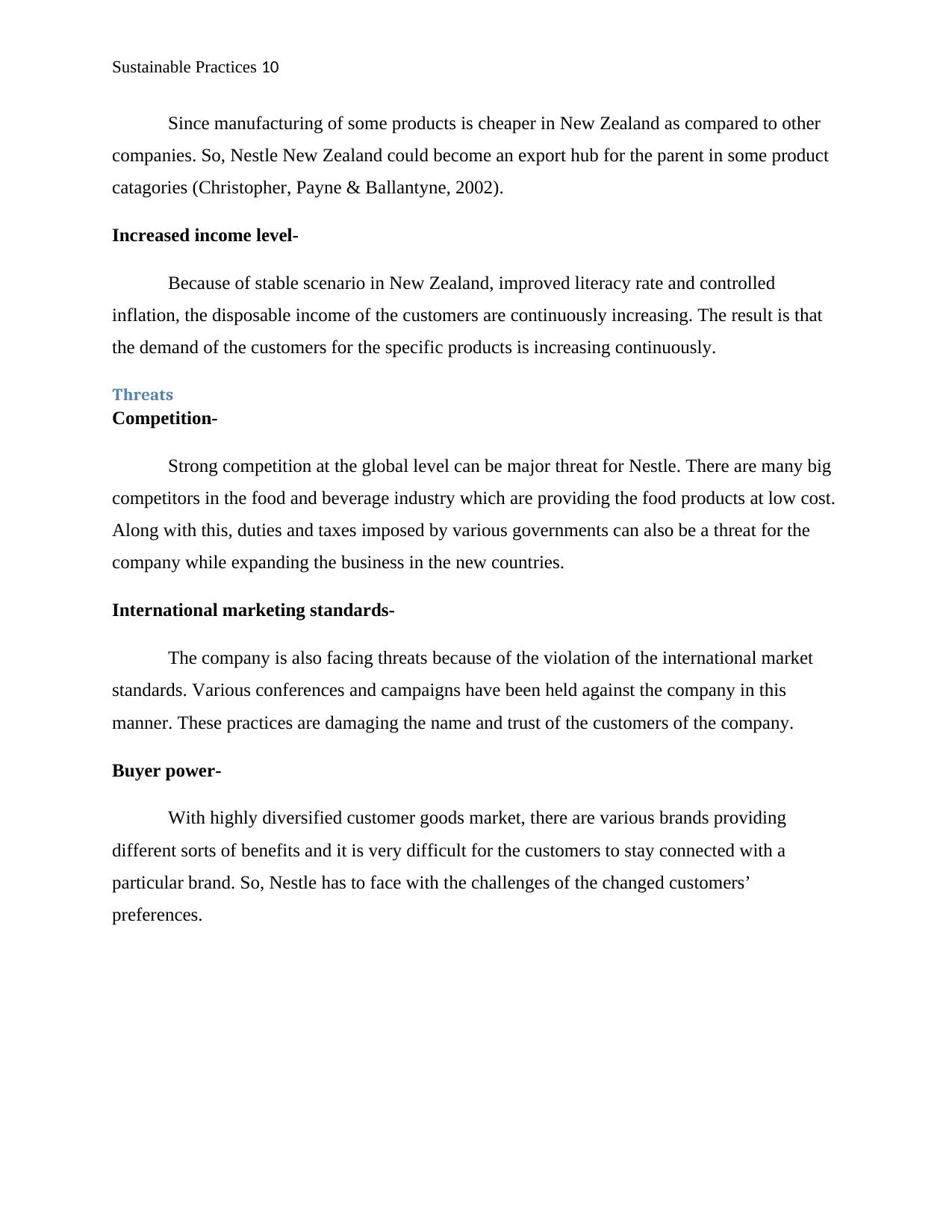
Sustainable Practices 10
Since manufacturing of some products is cheaper in New Zealand as compared to other
companies. So, Nestle New Zealand could become an export hub for the parent in some product
catagories (Christopher, Payne & Ballantyne, 2002).
Increased income level-
Because of stable scenario in New Zealand, improved literacy rate and controlled
inflation, the disposable income of the customers are continuously increasing. The result is that
the demand of the customers for the specific products is increasing continuously.
Threats
Competition-
Strong competition at the global level can be major threat for Nestle. There are many big
competitors in the food and beverage industry which are providing the food products at low cost.
Along with this, duties and taxes imposed by various governments can also be a threat for the
company while expanding the business in the new countries.
International marketing standards-
The company is also facing threats because of the violation of the international market
standards. Various conferences and campaigns have been held against the company in this
manner. These practices are damaging the name and trust of the customers of the company.
Buyer power-
With highly diversified customer goods market, there are various brands providing
different sorts of benefits and it is very difficult for the customers to stay connected with a
particular brand. So, Nestle has to face with the challenges of the changed customers’
preferences.
Since manufacturing of some products is cheaper in New Zealand as compared to other
companies. So, Nestle New Zealand could become an export hub for the parent in some product
catagories (Christopher, Payne & Ballantyne, 2002).
Increased income level-
Because of stable scenario in New Zealand, improved literacy rate and controlled
inflation, the disposable income of the customers are continuously increasing. The result is that
the demand of the customers for the specific products is increasing continuously.
Threats
Competition-
Strong competition at the global level can be major threat for Nestle. There are many big
competitors in the food and beverage industry which are providing the food products at low cost.
Along with this, duties and taxes imposed by various governments can also be a threat for the
company while expanding the business in the new countries.
International marketing standards-
The company is also facing threats because of the violation of the international market
standards. Various conferences and campaigns have been held against the company in this
manner. These practices are damaging the name and trust of the customers of the company.
Buyer power-
With highly diversified customer goods market, there are various brands providing
different sorts of benefits and it is very difficult for the customers to stay connected with a
particular brand. So, Nestle has to face with the challenges of the changed customers’
preferences.
Paraphrase This Document
Need a fresh take? Get an instant paraphrase of this document with our AI Paraphraser
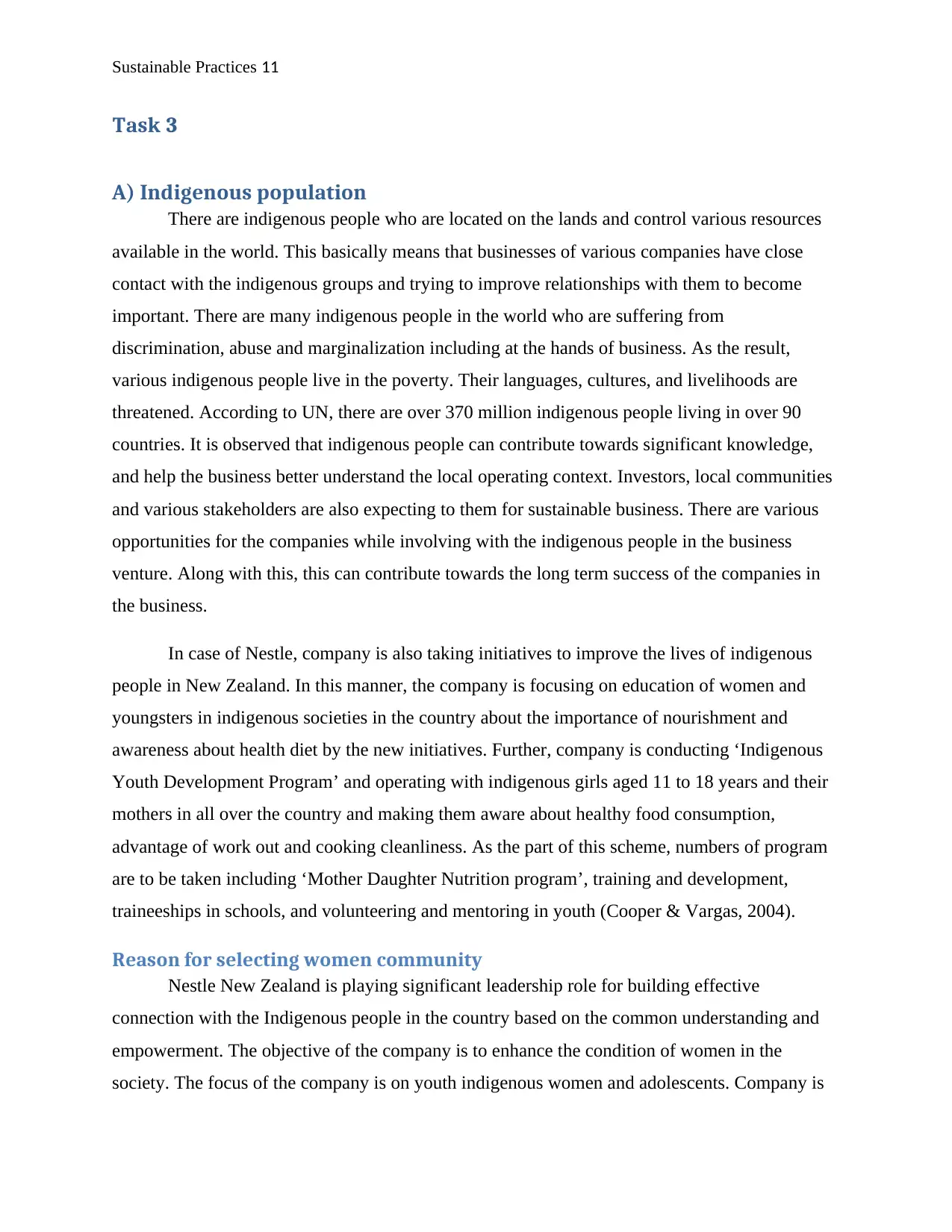
Sustainable Practices 11
Task 3
A) Indigenous population
There are indigenous people who are located on the lands and control various resources
available in the world. This basically means that businesses of various companies have close
contact with the indigenous groups and trying to improve relationships with them to become
important. There are many indigenous people in the world who are suffering from
discrimination, abuse and marginalization including at the hands of business. As the result,
various indigenous people live in the poverty. Their languages, cultures, and livelihoods are
threatened. According to UN, there are over 370 million indigenous people living in over 90
countries. It is observed that indigenous people can contribute towards significant knowledge,
and help the business better understand the local operating context. Investors, local communities
and various stakeholders are also expecting to them for sustainable business. There are various
opportunities for the companies while involving with the indigenous people in the business
venture. Along with this, this can contribute towards the long term success of the companies in
the business.
In case of Nestle, company is also taking initiatives to improve the lives of indigenous
people in New Zealand. In this manner, the company is focusing on education of women and
youngsters in indigenous societies in the country about the importance of nourishment and
awareness about health diet by the new initiatives. Further, company is conducting ‘Indigenous
Youth Development Program’ and operating with indigenous girls aged 11 to 18 years and their
mothers in all over the country and making them aware about healthy food consumption,
advantage of work out and cooking cleanliness. As the part of this scheme, numbers of program
are to be taken including ‘Mother Daughter Nutrition program’, training and development,
traineeships in schools, and volunteering and mentoring in youth (Cooper & Vargas, 2004).
Reason for selecting women community
Nestle New Zealand is playing significant leadership role for building effective
connection with the Indigenous people in the country based on the common understanding and
empowerment. The objective of the company is to enhance the condition of women in the
society. The focus of the company is on youth indigenous women and adolescents. Company is
Task 3
A) Indigenous population
There are indigenous people who are located on the lands and control various resources
available in the world. This basically means that businesses of various companies have close
contact with the indigenous groups and trying to improve relationships with them to become
important. There are many indigenous people in the world who are suffering from
discrimination, abuse and marginalization including at the hands of business. As the result,
various indigenous people live in the poverty. Their languages, cultures, and livelihoods are
threatened. According to UN, there are over 370 million indigenous people living in over 90
countries. It is observed that indigenous people can contribute towards significant knowledge,
and help the business better understand the local operating context. Investors, local communities
and various stakeholders are also expecting to them for sustainable business. There are various
opportunities for the companies while involving with the indigenous people in the business
venture. Along with this, this can contribute towards the long term success of the companies in
the business.
In case of Nestle, company is also taking initiatives to improve the lives of indigenous
people in New Zealand. In this manner, the company is focusing on education of women and
youngsters in indigenous societies in the country about the importance of nourishment and
awareness about health diet by the new initiatives. Further, company is conducting ‘Indigenous
Youth Development Program’ and operating with indigenous girls aged 11 to 18 years and their
mothers in all over the country and making them aware about healthy food consumption,
advantage of work out and cooking cleanliness. As the part of this scheme, numbers of program
are to be taken including ‘Mother Daughter Nutrition program’, training and development,
traineeships in schools, and volunteering and mentoring in youth (Cooper & Vargas, 2004).
Reason for selecting women community
Nestle New Zealand is playing significant leadership role for building effective
connection with the Indigenous people in the country based on the common understanding and
empowerment. The objective of the company is to enhance the condition of women in the
society. The focus of the company is on youth indigenous women and adolescents. Company is
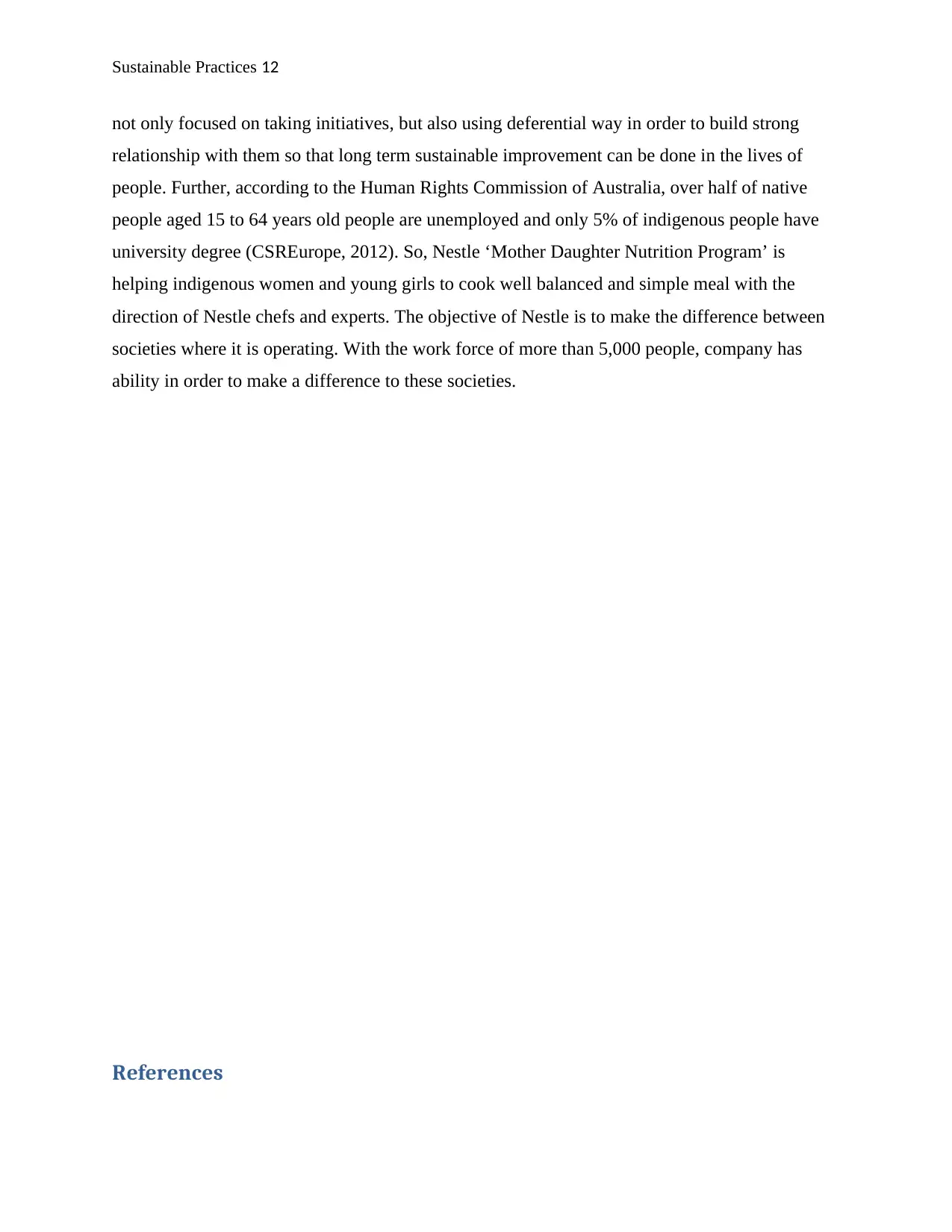
Sustainable Practices 12
not only focused on taking initiatives, but also using deferential way in order to build strong
relationship with them so that long term sustainable improvement can be done in the lives of
people. Further, according to the Human Rights Commission of Australia, over half of native
people aged 15 to 64 years old people are unemployed and only 5% of indigenous people have
university degree (CSREurope, 2012). So, Nestle ‘Mother Daughter Nutrition Program’ is
helping indigenous women and young girls to cook well balanced and simple meal with the
direction of Nestle chefs and experts. The objective of Nestle is to make the difference between
societies where it is operating. With the work force of more than 5,000 people, company has
ability in order to make a difference to these societies.
References
not only focused on taking initiatives, but also using deferential way in order to build strong
relationship with them so that long term sustainable improvement can be done in the lives of
people. Further, according to the Human Rights Commission of Australia, over half of native
people aged 15 to 64 years old people are unemployed and only 5% of indigenous people have
university degree (CSREurope, 2012). So, Nestle ‘Mother Daughter Nutrition Program’ is
helping indigenous women and young girls to cook well balanced and simple meal with the
direction of Nestle chefs and experts. The objective of Nestle is to make the difference between
societies where it is operating. With the work force of more than 5,000 people, company has
ability in order to make a difference to these societies.
References
⊘ This is a preview!⊘
Do you want full access?
Subscribe today to unlock all pages.

Trusted by 1+ million students worldwide
1 out of 14
Related Documents
Your All-in-One AI-Powered Toolkit for Academic Success.
+13062052269
info@desklib.com
Available 24*7 on WhatsApp / Email
![[object Object]](/_next/static/media/star-bottom.7253800d.svg)
Unlock your academic potential
Copyright © 2020–2026 A2Z Services. All Rights Reserved. Developed and managed by ZUCOL.




